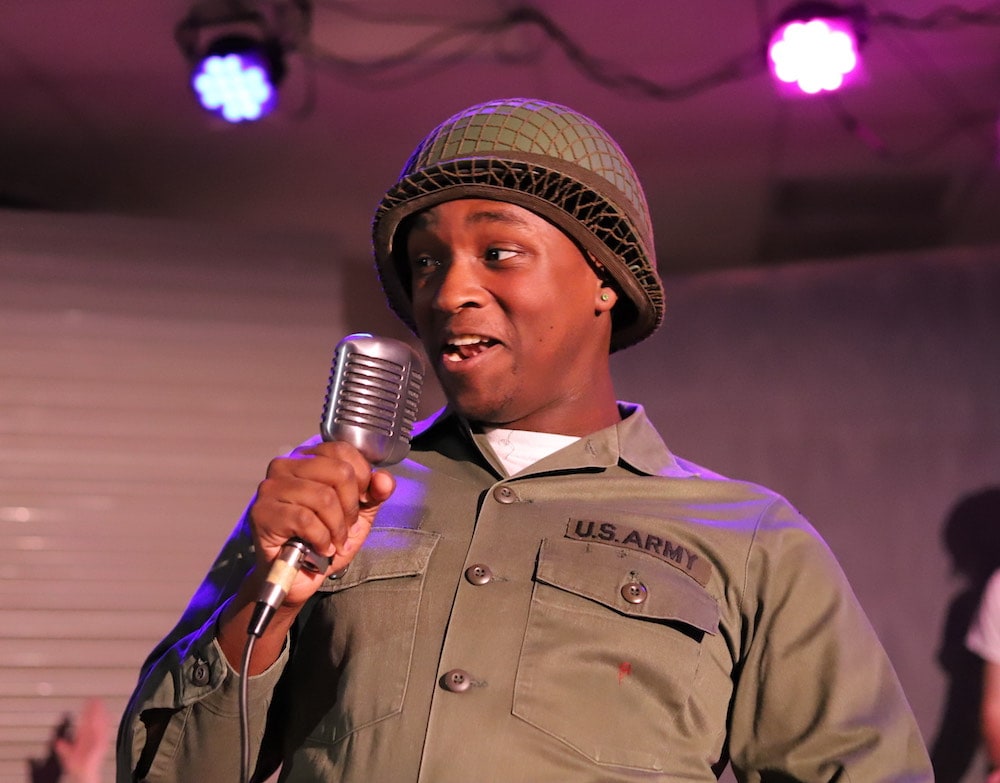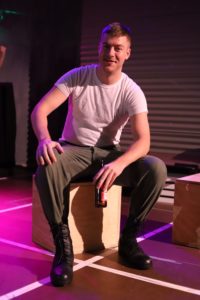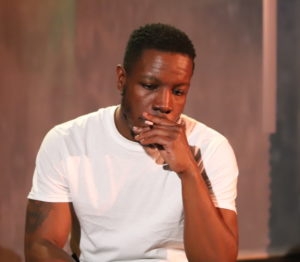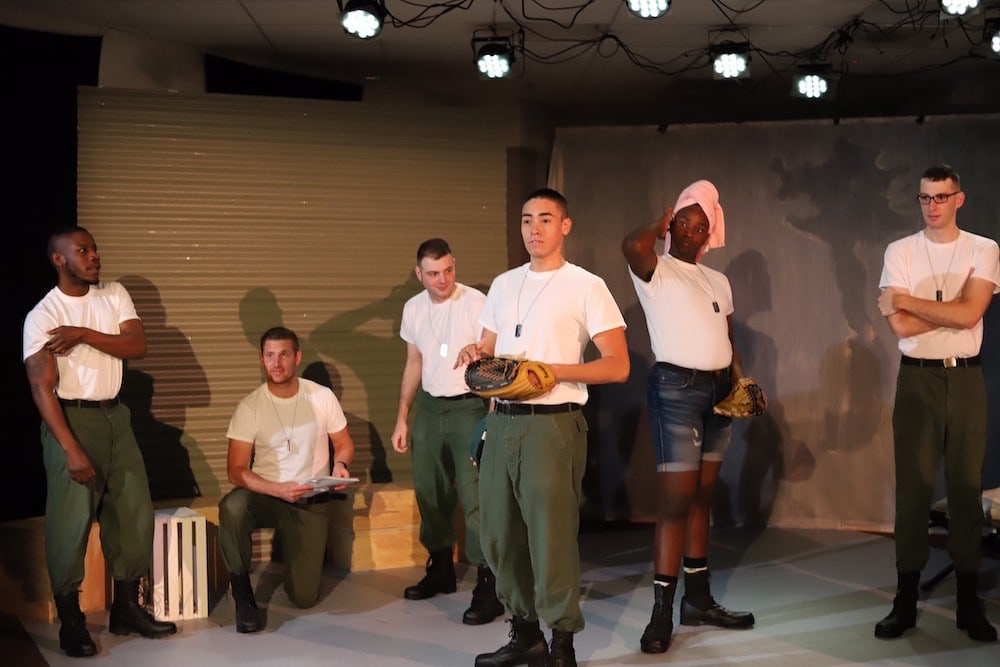This world premiere comic drama about gays in the military takes us back to July and August of 1964 when LBJ was ordering American ground troops into Vietnam in response to the Gulf of Tonkin incident (which we were later to learn was fake news). Against that unfolding tragedy of toxic macho bellicosity, Rainbow Theatre Project’s Blue Camp deploys a human interest story with tenderness and truth.
Based approximately on actual events, Blue Camp is set at an Army camp where unacceptable soldiers are awaiting military disciplinary action. On a bifurcated stage, there’s a “blue” barracks for suspected homosexuals and a “green” barracks for accused criminals. Neither love nor lust is lost between them. The straight malefactors insult the may-be gays with ribald digs, and the gays return the fire with flaming shade. Prominent among the blue boys is Billy, who wears his queerness like a badge of honor (“I told the bastards the truth from day one”) and doubles as a drag entertainer.

Billy was inspired by an African American gay man named Perry Watkins, who was decorated for his service, performed in drag in military clubs across Europe, and was one of the first to challenge the military ban on homosexuals. Doubtless because Watkins in life was so iconic, Billy is the most memorable character in Blue Camp, and he is played by an assured Moses Bossenbroek with extraordinary charisma.

There’s enough sexual innuendo humor and fabulousness in Blue Camp to earn the adjective blue and the noun camp with distinction. Especially in the rivalry between the barracks at the beginning, the jokey banter among the gay characters and their wicked rejoinders to the straight characters’ taunts come off like a queer comedy in camo.
Playwrights Tim Caggiano and Jack Calvin Hanna have created a vivid cast of characters, crafted crackling dialog, and told a fascinating story packed with tension and high stakes. A dishonorable discharge would mean disgrace and no G.I. Bill. So we have seven soldiers onstage who are uniformly on edge.
Billy has survived in the service because he can type 120 words a minute and entertains in feminine finery at the officers club. But make no mistake: he’s also a serious jock and fierce cadet.

Gary Peterson (Lansing O’Leary), after having suffered a religious exorcism “to kick out the homosexual demon,” was ordered by his preacher and parents to enlist in the Army because it would make him a man. He is now assigned to the blue platoon because he got caught getting blown by a barracks mate.
Jantzen Hill (Jared Swain) was stopped for speeding by an MP whose ample bulge he fancied. They spent eight days and nights in a hot tryst, then the closeted MP, to avoid detection, ratted on him.
Arnold Malloy (Daniel Riker) is a brainy bookworm and scholar on gays in art and literature. He’s in the blue barracks because his stash of classical male nudes and homoerotic lit got discovered. “I’m being punished for having taste,” he says—to which Billy retorts, “Whom did you taste, dearie?”
Alvin Bailey (Ivan Carlo) is a straight solder consigned to the green barracks because he stole an Army jeep for the hell of it. He gets his kicks from theft, a habit he got into “when my Mom would sleep on the couch all day and I’d get hungry. I’d go steal food. It was so exciting. I started taking other shit.”
Barry (Rocky Nunzio), another straight soldier, is in for going head-over-heels-in-love AWOL: “I just wanted to see my girl…five times,” he explains.

Theus McCutchen (Reginald Richard) is a straight soldier charged with murder, so his case is pending trial in a military court. Seemingly the most hardened criminal (a toughness Richard nails), Theus also has the most psychologically brutal backstory (which Richard delivers with affecting feeling). It’s not exculpatory, but it’s emotionally explanatory. When he was a child, Theus watched helplessly as his mother was beaten by a stepfather, who then turned his wrath on him. Years later, Theus was chatting up a woman in a bar when a man claiming to be her husband started slapping her—and Theus snapped.
Military brass are represented by Steve Dugger (Noah Beye), a gay-friendly corporal who’s got a drinking problem; The Colonel (a scarily brash Craig Houk), determined to get grunts on the ground in Nam; and Sergeant Swanger (Jared H. Graham), who is put in charge of processing these “delinquents and queers” for a dicey tour of duty.
“What difference does it make if we throw deviants at the commies?” says the cynical Colonel. “Hell, we can throw them back in the gutter after we win the war, if they make it back.”
In this perilous context are touching scenes of unexpected connection between the men. For instance, Janzen and Alvin bond like bromantic buds over racecar driving and car mechanics. Billy composes for Gary a coming-out letter to send to his mom and dad if he doesn’t come back—
BILLY: The truth will set you free.
GARY: Do you ever think about hell? …
I mean for being, well…like the way you are.
BILLY: Hell is trying not to be the way you are.
—after which Gary and Billy share a quick kiss. Improbably even Sergeant Swanger and Billy have a slow dance at the officers club. Such moments of fleeting feeling are where Blue Camp opens its heart.
The production directed by Christopher Janson is serviceable. Its shoestring budget shows, and it has been shoehorned into a church meeting room with all seating on the same level and low, acoustical-tile ceilings. The play deserves another run in better circumstances. Still, despite these limitations, Lighting Designer Elliott Shugoll has rigged an effective array of spots and LEDs, and Set Designer Simone Schneeberg serves the storytelling with corrugated steel walls, a back-lit projection screen, versatile wooden cubes, and a strand of slats hung from a clothesline that pulleys in and out to separate the green barracks from the blue.
Costume Designer T.F. Dubois does the military garb persuasively and gives Billy best-of-show in a boa-trimmed gown for the big Act One finish. And Sound Designer Elliott Lanes plays back a nostalgic triumph of sixties tunes (The Chordettes’ “Lollipop,” The Beatles’ “Twist and Shout,” The Beach Boys’ “I Get Around”…) along with haunting copter effects.

What keeps us at attention in Blue Camp is what the authors were up to. It takes hold as we learn the characters’ compelling backstories, what they’re in for and why, and in the idiosyncratic instants when they connect in spite of all that divides them. It unfolds in enjoyable incidents based on true stories such as Billy’s performance in drag at the officers club, and the green and blue barracks’ face-off in a baseball game (called by James Gardiner in voiceover), which was Sergeant Swanger’s idea “to build morale and comradery.” And the emotional momentum builds with inter-scene news flashes that track the Tonkin Bay attack and subsequent escalations in the administration’s warmongering (announced convincingly by Rick Foucheux).
We get to know these guys. We come to care about them. We want none of them in the line of fire. Looking back we want the Vietnam War never to have happened. Which is why the mounting far-off military calamity and the intimate character storylines in Blue Camp intersect at the end with such a lump in the throat and punch in the gut.
Running Time: One hour 55 minutes, including one intermission.
Blue Camp plays through November 24, 2019, presented by Rainbow Theatre Project performing in the Thurgood Marshall Gallery at Saint Augustine’s Episcopal Church, 555 Water Street SW (across from Arena Stage), Washington, DC. Purchase tickets online.




